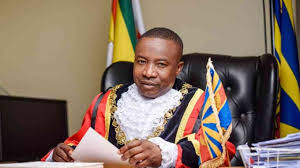
FOLLOWING the ongoing Justice Cheda Commission of Inquiry into City of Harare financial management is a shocking and sad experience.
The city is rotten to the core, no systems in place and no one in control.
There is something wrong with the structure of local governance.
Mayor Jacob Mafume looked like a rabbit flashed by a car’s headlights during the hearings.
The man was flustered, bruised and above all reduced to a heap of incompetency, impotent mayor and only good at abusing his office for personal gain.
Mafume did not know the address of his new home.
He blamed his wife for the failure to comply with council’s building by-laws and had absolutely failed to make his executives procure an Enterprise Resource Planning software in more than five years.
The lead investigator was sadistic.
- HCC considers cancelling ZimPhos contract
- We're not immune to prosecution: Land developer
- Govt to blame for Mupedzanhamo chaos
- City of Harare, Augur deal legit: Supreme Court
Keep Reading
He kept making demeaning comments, made Mafume small and above all, tried to make the mayor look like a pathological liar.
Mafume made things worse for himself by volunteering information that had not been asked.
Mafume is in a pickle and he knows he is toast.
The commission will have him for dinner.
The city will be ripped and most likely an administrator will be appointed to rescue the city.
Above all, President Emmerson Mnangagwa and Zanu PF would have achieved their goal of making the opposition look incompetent and corrupt.
Zanu PF will regain the city that it has perennially lost in elections since 2000.
However, that will not change the structure of local governance.
It is the change in local governance that is needed.
It is the implementation of the letter and spirit of devolution as enunciated in the 2013 Constitution.
Local authorities need executive mayors, competent executives and knowledgeable councillors.
They need autonomy in recruitment and dismissal of senior executives.
The Local Government Board (LGB) should be disbanded.
The central government should not try to have control of cities and towns through recruitment of senior council executives.
This type of local government is seen in Cape Town, South Africa.
I deliberately make this example for two main reasons — proximity to Harare and that both are opposition controlled.
Oops, sorry, I had forgotten to say also a competent opposition.
The Democratic Alliance (DA) has a clear process of identifying its representatives or candidates.
More than 90% of its candidates are based on merit rather than popularity.
Secondly, the DA knows and plans well in advance who shall be the senior executives in the city.
It employs senior council executives primarily on two qualities — meritocracy and appreciation of its values/plan.
The DA does not go into power to do the routine, but it does make an imprint, to change things and deliver.
This has been helped by the law in South Africa.
The South African constitution has devolution clauses.
The Local Government Act is also clear that cities are led by executive mayors and their powers clearly defined.
Executive mayors hire senior executives who are aligned with their plans and whose loyalty is solely on the appointing authority.
South Africa does not have a LGB to hire or recommend senior executives for cities and towns.
Councils have autonomy and responsibility.
They cannot shift blame to a central government office for their failures.
This is the norm in progressive societies. Most cities are run by executive mayors, not bureaucrats.
It is elected representatives who make promises to the electorate and bureaucrats are there to serve.
The world knows the mayors of New York, Paris, London, Tokyo, Berlin and Cape Town more than the city executives.
That should be the norm, unlike here where a town clerk masquerades as the face of a city.
Public office should be made attractive to competent and qualified people and politics should be more about brains than brawn.
This has been a missing ingredient in our politics and the love of the party leaders to be also candidates, thus blurring the line between party and representatives.
This makes it difficult for the party to supervise its deployees or take decisive action against errant members.
The opposition should have been the first to intervene by grilling its public representatives for failure to deliver basic services and having its books audited.
It should also have censured or recalled its councillors involved in illicit land deals.
The autonomy of local authorities, while guaranteed, should be clear when the central government can intervene.
It is my humble opinion that the central government should only interfere when there is a complete breakdown in service delivery and if a council is in financial distress.
Central government can also intervene if a council fails to get an audited financial statement in two years (24 months), as it cannot be allowed to continue existing without knowing its financial health.
These interventions by the central government should be done in a transparent manner and a laid down process, not in an ad hoc or selective manner.
More often than not, the central government has targeted opposition-led councils when the same rot is experienced in Zanu PF-controlled rural district councils.
While the ongoing Harare commission has been a public spectacle, Zimbabwe should not lose focus of the goal — to improve public service delivery and responsible use of public funds.
It should also be a big lesson to political parties that they need to find better candidates for public office, councillors knowledgeable and able to hold council employees to account.
Besides the sideshows of possible dismissal of councillors and some senior executives, it remains important that Zimbabwe should relook at its local governance model and borrow a few things from other progressive countries like South Africa, the United Kingdom, Germany or the United States on managing cities.
The Local Government minister should move in to steer the devolution and Local Government Bills in line with Chapter 14 of the constitution.
The people should have power to run their local affairs, but they cannot be allowed to be little tyrants.
We need new cities.
New in everything — quality of councillors, service delivery and council employees and above all, less government interference.










